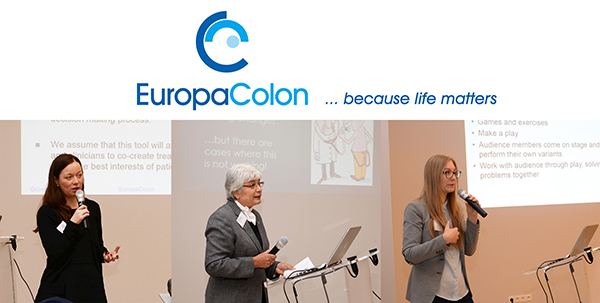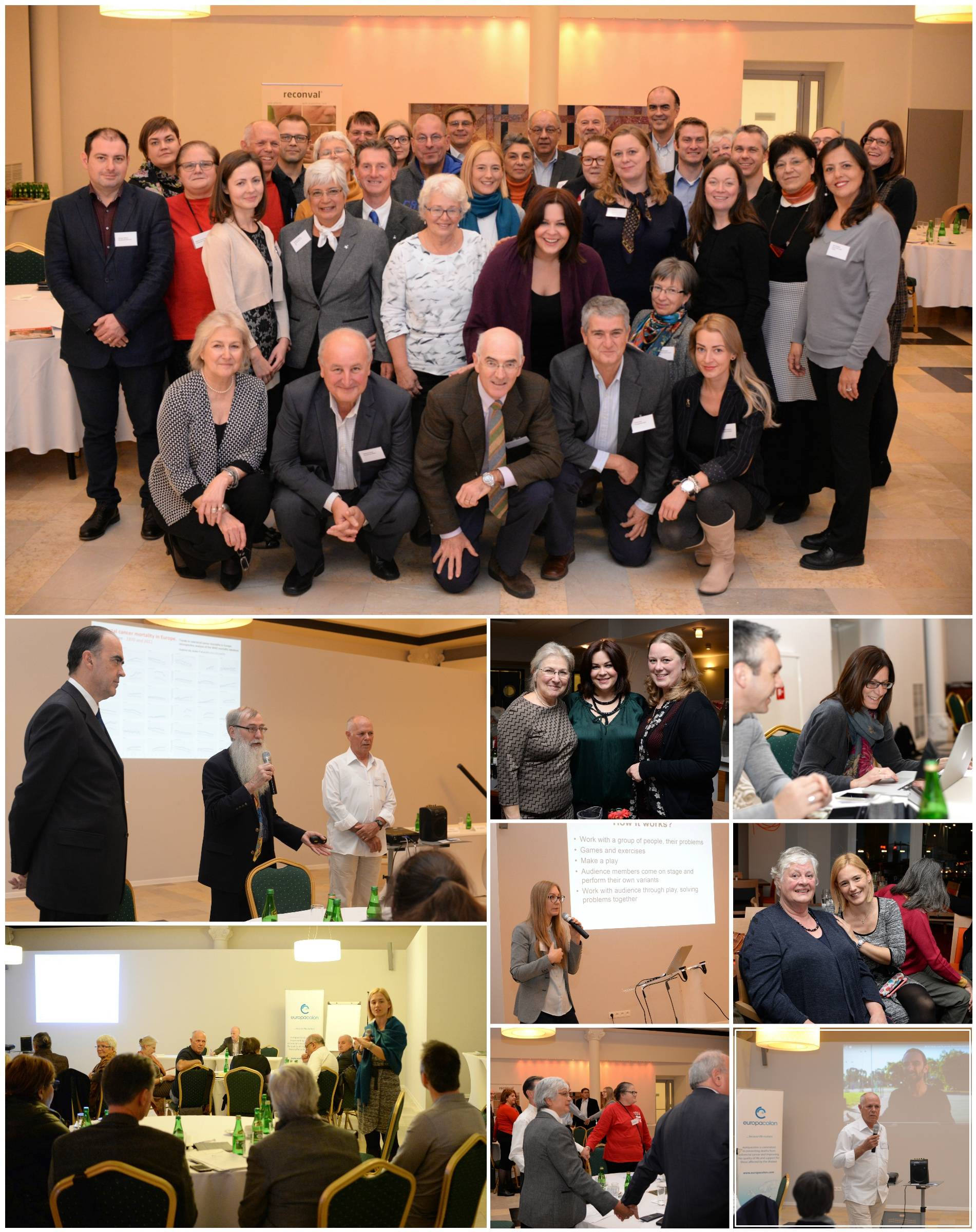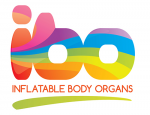EuropaColon's First Advocacy Masterclass 2015
On Thursday 5th November 2015, members from EuropaColon�s Affiliate and Associate groups from across Europe met in Warsaw for their first Masterclass. Whilst we usually have an Annual Meeting, the intention this year was to provide an even more structured programme looking at advances in cancer care; at the support needed by patients and how we could deliver this more effectively and finally to present an update on colorectal cancer (CRC) screening in Europe.
We opened the meeting on Friday afternoon with Module 1, a guest lecture from Professor Patrizio Giacomini (Italy) entitled Evolving Science, looking at Immunotherapy and other advances in the science of cancer.
Cancer, as he explained, is essentially a multiplicity of mutations, each constantly developing making new variations or mutations, which is why the science and treatment is becoming more and more complicated. Our understanding is being helped by advances in DNA sequencing but it also means we need to be keeping abreast of the changes and evolution of the cancer.
�

A focus of the presentation was liquid biopsy, looking at the benefits and opportunities this offers both the doctors and the patient as the cancer develops. (Liquid biopsy is the analysis of a blood sample tracking cancer cells in the blood). It is non-invasive, has quick turn around and enables the analysis of information released by the tumour into the blood stream.
The test shows how active the tumour is becoming as the more cancer cells seen in the blood, the more active is the tumour. The technique will be particularly useful in monitoring return of any cancerous activity post initial treatment.
The development of this methodology will be very useful, especially in CRC as these tumours replicate very fast having some of the greatest mutational activity of all cancers, making it a particularly good target for immunogenic therapy. All cancer sites have signatures which enables the identification of the tumour site; making it possible for the liquid biopsy to detect additional activity and the source. Once the system is in place the running costs are relatively low.

The second presentation was from Dr Michael Stecher (US) who discussed the trial his company is sponsoring to manage cachexia in patients with CRC. It is quite common for cancer patients to lose around 5% of their body weight in 6 months (this is the definition of cachexia). �
The trial consisted of 335 patients with advanced CRC, a cross over from the placebo arm was allowed after 8 weeks. Enrolment was completed in September 2015 and final analysis was done in December 2015. End points of the trial were the reversal of symptoms (appetite loss, fatigue and pain) these being demonstrated along with an increase in muscle mass, which was not initially expected. The trial also addressed traditional radiographic tumour changes.
Indications are very positive, despite the patient population being very sick at the time of recruitment. It was a blinded study and while there were very few adverse signals, there was a 60% muscle mass increase and 50% improvement of symptoms. The trial is also offering participants an unexpected 9 months extra life.�
Jola Gore-Booth, Founder and CEO, opened the third session of the day with an update from HQ on developments and activities over the past year. �Jola set the scene for a busy year of meetings and changes as the organisation expands into digestive cancers.
Geoffrey Henning, Director of Policy, followed with an update on progress with the expansion of the organisation into pancreatic and stomach cancer. He also shared the positive progress on the Doctors Training Programme, reporting that funding has now been secured and work will begin soon to develop the website. EuropaColon is a partner on this exciting new project. The weekend following the Masterclass the third Improving Outcomes in Cancer took place in Lithuania in collaboration with POLA, the local cancer organisation and one of our Associate Member groups.
Geoffrey also discussed the effort the organisation was putting into developing relations with clinical groups as EuropaColon feels this is essential if the messages from all parties in the healthcare environment are to be heard by politicians. To this end an Ambassadors Programme has been established to recruit more clinicians to work with us and our Groups at European and national levels.
Zorana Stokic, Director of Group Development, reviewed progress over the past year with our Affiliates and Associates and introduced the new groups who had joined EuropaColon the family. She welcomed Belarus, Romania (our second Group), Estonia, Malta, Belgium and Turkey (second Group) and wished them luck the very best with their endeavours.
Module 2 - Access to Treatment - was opened by Dr Robert Moldach, Co-founder and CEO of the Institute of Health and Democracy (Poland). He gave some very useful tips about the need to adopt a very structured approach when developing any programme of action. He emphasised the need to work with the PESTEL method to assess objectives and actions. He showed how this was applied in a number of different examples to deliver effective understanding of the issues and suitable outcomes. He also stressed the importance of involving as wide a range of stakeholders as possible.�
Stanimir Hasurdjiev, Chair, National Patients Organisation (NPO) (Bulgaria) although only established in 2010, this organisation is already one of the biggest and most influential NGO�s representing over 80 patient organisations in the country. As a result the voice of the patient is being heard throughout the health system. A major success has been achieved around access to suitable healthcare. It was initiated in September 2012 with a high level regional meeting and quickly transferred to Brussels and is now the basis of a multi stakeholder partnership across Europe.
Possibly the most important achievement is the establishment of a permanent consultative body to the Council of Ministers in Bulgaria under the chairmanship of the Minister of Health. Achievements to date include consensus on draft health legislation and involvement in the reform and quality of the local health care system and drug and medical products policy. Stanimir�s presentation was a testament to what can be achieved with focus and commitment offering an interesting call to action to those attending the meeting.
Ms Kristine Liepina, EuropaColon Latvia, rounded up the module with a case study of a small organisation working to bring about change in a difficult environment using a very structured approach. By collaborating with other similar organisations their message gained more traction and allowed them to be heard. EuropaColon Latvia have organised some very effective public awareness campaigns using very visible tactics and messaging. Their Annual Conference with its accompanying publicity effectively raised the profile and recognition of CRC. All this activity helped to secure them a place at the policy table in Latvia and gives them the opportunity to speak out on behalf of their patient population.
The day ended with Zorana Stokic presenting plans for a very important survey EuropaColon is hoping to carry out - Understanding the unMet Needs of Patients with mCRC. It is intended that the survey should embrace a minimum of 1,000 patients in 10 European countries. The driving need for this survey is a general lack of understanding about the circumstances and needs of patients with advanced disease. This is not only affecting access to medicines development and treatment options but also research into CRC. EuropaColon are confident that the results of this survey a sizeable difference to understanding the issues and lives of people with advanced CRC could be achieved.
Day 2 kicked off with Module 3 - Patient Empowerment. The session was opened by Sandra Quinn (Scotland) who explained the rationale and development of an exciting shared decision making tool helping doctors and patients manage appointments and outcomes more efficiently. The tool is developed through an interview process involving a patient and third party who prepares an A4 report for the doctor. To date after research into 3 different cancers the results have been very successful.� Patients are better informed and more prepared for their appointments, seem to be less likely to regret decisions taken or to select invasive treatment options. The team is looking at ways to make the tool accessible for rural populations and the option to develop co-created treatment plans.
Session 2, led by Geoffrey Henning, introduced an in depth discussion on patient empowerment. Geoffrey confirmed that more and more patients were seeking information about their diagnosis and how they might cope with their health problems. It is clear from research that health literacy benefits all parties; society (saving money), the patients (giving them peace of mind) and clinicians (helping them to deal with the questions and issues faced by their patients). Furthermore, research shows that people with greater literacy skills have better health! Earlier in the year the European Patient Forum (EPF) launched their empowerment campaign, stressing the 5E�s � Education, Expertise, Equality, Experience and Engagement. More information can be found at www.eu-patient.eu.
Mrs Barbara Moss (UK), Chair of the EuropaColon Expert Patient Advisory Group, rounded up the session taking empowerment a stage further. She emphasised that patients were joint partners in their care and treatment and that they had a responsibility to be self and health aware.� Speaking from her personal experience of taking control and putting herself in charge she explained the importance for patients of such action. However this process was not easy sailing as many clinicians still fail to grasp the importance of patient empowerment. She stressed that time was on the side of patients and systems would change.
Module 4/5 - Innovation in Patient Support/Sustainability gave the meeting opportunity to look at the tools adopted by a couple of Member groups to support patients with cancer.
Associate Group � Oncopatient (Belarus) shared how they use Forum Theatre to help people adjust to and change their world after a cancer diagnosis. They help people overcome their shyness and build connections with others through games and exercises, thus helping to resolve their individual issues. Most people talk about the past but this work looks to the future. Outcomes from these sessions inspire people to speak, create, change and do, leading to positive behavioural change between patients and doctors.�
Associate Group - Dance with Cancer (Turkey), demonstrated how they work with social media to support their patients. They sited their Facebook page which receives 600,000 hits a week. They also use seminars on U-Tube to raise awareness and show people stories, experiences and webinars to support people with cancer.
We were delighted to welcome Julien Wiggins, CEO Bowel Cancer Australia (BCA), to lead the roundtable discussion on how BCA assess the needs of their cancer population and how this helped them develop suitable support services. He looked at how these match what different groups in Europe might offer their patients. The purpose of support is to help decrease the isolation often caused by a cancer diagnosis and can be aggravated by early-onset diagnosis. Among Australia patients, the preferred support is one to one via email and/or telephone and second choice was group support. This was identified as a result of a survey of patients in 2008. BCA then instituted a buddy system where they match patients with someone who has been through same or similar clinical experience. The survey also delivered other interesting results: 48% of patients give up work or reduce their work hours, 37% feel anger and frustration about their diagnosis, but most alarming was the 54% who say they were not given a choice of treatment.�
The range of support offered by BCA is varied and includes help with empowerment, education, access to screening, colonoscopy, surgery and treatment.� Fundraising initiatives include mailings to lawyers to help people bequest to the charity through wills.� BCA also send leaflets to funeral parlours as friends and family often ask for information about organisations to support.
Over the years BCA have recognised the importance of not duplicating work and have merged with smaller local organisations creating one nationally representative organisation providing support for all colorectal cancer patients. This has brought more credibility to the organisation and laid down the foundations for its current successes.�
Module 6 - Making Noise Lindsey Brown Burden, (Brown Burden Associates), presented ideas and proposals for European Colorectal Cancer Awareness Month 2016 (ECCAM). This was a very interactive session where the Groups all contributed their thoughts and ideas to ensure the success of ECCAM 2016. Consensus was hard to reach, however due to Lindsey�s determination, a three year plan was agreed on.
�The focus of the campaign is �MAKING NOISE ON COLORECTAL CANCER�, each year focusing on a different aspect of the disease. ECCAM 2016 would kick off with the important subject of Lack of Formal Population Screening Programmes in Europe.�
The day ended with an informative night-time coach tour of old Warsaw followed by a dinner at one of the cities delightful restaurants where local delicacies were enjoyed by all.
Day 3 - Module 7 was focused on the critical issue of CRC Screening.
This session was moderated by Professor Stephan Halloran, who also led the discussion with a series of enlightening slides. He spent some time discussing the situation in England where he was head of a very successful screening hub. With examples he showed the arrangements the programme had adopted and how it enabled regular reviews and updates.
Then, in a detailed analysis, he showed that despite the well known benefits of CRC screening in terms of saving lives, there is a HUGE amount of work still to be done across Europe. Only 3 countries in Europe have fully completed their roll out so far! The good news is that many are currently striving to roll out CRC screening in their countries. It is however sad to note that in some countries opportunistic screening is still the only option being offered to citizens. The European guidelines recommend that formal population screening should be available for all citizens over the age of 50.
Professor Halloran presented a number of recommendations for a successful screening program:
- Commitment from �the top� -� Funding is a key element
- Organised - an Effective IT system is essential to manage and monitor the programme
- Professionally lead - Multi-professional support
- Evidence based processes - Changes are piloted, performance is monitored and the system is subject to periodic reviews
- Cancer registry � data access is key
- Open and transparent � meaning all of the results must be published
- Mechanism to update � there must be flexibility in the system to enable timely updates and programme improvements.
The systems for collecting samples are changing - the early recommendation was for guaiac-based FOBT but many countries are introducing Faecal Immunochemical Tests (iFIT). The iFIT trial in the England has shown considerable benefits in terms of reaching groups that otherwise do not respond well to gFOBT screening invitations. The benefit of iFIT is a single and simplified collection of samples as opposed to the 3 samples required for gFOBT. These results suggest that the �difficult� to reach population including men are more likely to respond to the invitation to submit a iFIT sample, than gFOBT.
Professor Halloran�s presentation was followed by an innovative example of how to raise awareness for our member Groups. Mr Shlomo Lewkovicz - Zav Menia (Israel) shared a number of videos with the meeting, demonstrating the creative approach they used for effective awareness raising and how this increased public interest in CRC screening. The audience was very impressed by the scope of these creative ideas adopted by what is effectively a relatively small NGO. Well done to Israel.
Our final next speaker of the day, Dr Luc Colemont - Gastroenterologist (Belgium) shared the awareness work of his organisation in Flanders - StopDarmkanker. He stressed that over the past 360 days, 1million people aged between 56 and 74 would have died from CRC. It was clear he was angry as the CRC screening guidelines were published by the European Union in 2011 and by 2014 there was insufficient adoption of the recommendations. He continued that 87% of colonoscopy procedures in Belgium are undertaken for reasons other than screening and only 13% as a result of the screening programme.
Dr Colemont pointed out that of the tragedies in our economically constrained world today is that on average only 3% of the health budget of any country is spent on prevention (down from 5%). In many countries even this small amount is being eroded! The advantages of screening are clear for CRC, costing only �3,000 per healthy life. Cervical and breast cancer cost �15,000 and �23,000 respectively. He concluded that there was no excuse for delaying the implementation of CRC screening!
Jola Gore Booth closed the meeting with some actions and concluded that the meeting had been an overwhelming success. All the presentations, audience feedback and participations was extremely rewarding and unanimously the room agreed that a second Masterclass in 2017 would be an important part of next steps for EuropaColon.
Agreed actions from the meeting:
- ECCAM 2016 � Making Noise � joining together to make noise on lack of formal population screening programmes in Europe.
- Set up patient support networks
- Find funding to kick start Survey on unmet needs of patients with mCRC
- Digestive Cancers � continue to grow the community and the range of diseases
- ECCAM 2017 - Equitable Access to Treatment
- Second Masterclass � May 2017




-(2).png)
.png)

